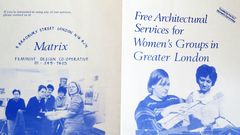Die Ringvorlesung befasst sich mit kollektiven Praxen wie sie sich seit der zweiten Hälfte des 20. Jahrhunderts in Kunst und Architektur manifestieren und diese zugleich prägen. Kunst- und Architekturhistoriker*innen, Architekt*innen und Künstler*innen diskutieren die Rolle von Kunstkollektiven und architektonischen Kooperativen in ihrer Beziehung zu sozialen Bewegungen, Bürgerinitiativen und der öffentlichen Verwaltung. Dies ermöglicht es uns, Protokolle der Entscheidungsfindung, die Organisation von Arbeit und Rahmenbedingungen für Umweltgerechtigkeit zu durchdenken. Als Arbeitsumgebungen versuchen Gruppen und Kollektive oft, durch ihre Projekte eine ökologische Ethik zu etablieren: Wie entfalten bewusst gewählte Formen und Formate der Zusammenarbeit ihre räumliche Wirkung und ihr politisches Potenzial? Sind gemeinschaftliche Unterfangen per se kurzlebig oder aufgrund von Vielstimmigkeit und Reibung zwischen Individuen auf Dauer gar zum Scheitern verurteilt? Welche Methoden gibt es, um solche Praktiken in der historischen Forschung adäquat zu thematisieren und darzustellen? Von der Nachkriegsavantgarde bis zum (Post-) Minimalismus im Bereich der Künste, von der bürokratischen bis zur feministisch-aktivistischen Architekturpraxis – auf den Spuren historischer und zeitgenössischer Formen der Zusammenarbeit und kollektiven Kritik: Diese Vortragsreihe erweitert unser Verständnis von Autorschaft, Werk und Oeuvre. Dabei dekonstruieren die Beiträge nicht zuletzt den Geniekult in einer menschengemachten Umwelt, wie sie unterschiedliche geopolitische Kontexte und transkulturelle (Post-)Modernismen seit dem Kalten Krieg verankern.
In Zusammenarbeit mit Lenbachhaus München im Vorfeld der Ausstellung GRUPPENDYNAMIK – Kollektive der Moderne, 19. Oktober 2021 – 24. April 2022.
This lecture series tackles collaborative practices manifesting and shaping, in turn, art and architecture since the second half of the 20th century. Art and architectural historians, architects, and artists will discuss art collectives and architectural cooperatives' roles in relation to social movements, citizen initiatives, and public administration. This allows us to think through decision-making protocols, the organization of labor, and frameworks for environmental justice. As working-environments themselves, groups and collectives often try to establish eco-logic ethics through their projects: How do consciously chosen forms and formats of a collaboration unfold their spatial impact and political potential? Are collaborative ventures per se ephemeral or even doomed to failure in the long run due to polyphony and friction between individuals? What are the methods to adequately address and represent such practices in historical research? From Postwar avant-garde to (post-)minimal in the field of the arts, from bureaucratic to feminist/activist in architectural practice––by tracing historical and contemporary forms of collaboration and collective critique, this lecture series expands our understanding of authorship, work, and oeuvre. Hence, the contributions deconstruct the cult of genius in a human-made environment situated in different geopolitical contexts of transcultural (post-)modernisms since the Cold War.
In cooperation with Lenbachhaus Munich at the eve of the exhibition GROUP DYNAMICS – Collectives of the Modernist Period, October 19, 2021 – April 24, 2022.
When
19.04.21
Gabrielle Schaad, (TUM, Munich)
Introduction: Collective Practices and Cooperative Initiatives as Environmental Critique c. 1980
26.04.21
Mary Miss (Artist, New York)
City as Living Laboratory: A Path to a Resilient and Equitable Public Realm
03.05.21
Andrea J. Merrett (Columbia University, New York)
Feminist Practices of the U.S. Women’s Movement in Architecture: The Open Design Office (1972–1978) and the Women’s School of Planning and Architecture (1974–1981)
10.05.21
Janice Mitchell (Central Saint Martins, University of the Arts, London)
Collectivity as Strategy and Praxis in the Work of Claire Fontaine and Jonas Staal
17.05.21
Dana Buntrock, (University of California, Berkeley)
Architecture Needs More Amateurs
31.05.21
Katia Frey & Eliana Perotti (ZHAW, Winterthur)
Conflicts and Success of Creative Cooperation: The Swiss Exhibition on Women’s Work SAFFA 1958
07.06.21
Khensani de Klerk & Solange Mbanefo, (Matri-Archi(tecture), Switzerland/South Africa)
Collectivizing Knowledge: A Digital Atlas of Collaborative Geographies
14.06.21
Jos Boys (University College London UCL, London)
Opening up the Archive – Capturing the Processes of Matrix Feminist Design Co-operative
21.06.21
Stephanie Herold (Otto-Friedrich-Universität, Bamberg)
The Shared Work of the Collective – Ideas of Socialist Community and Productive Efficiency in Architectural Collectives of the GDR
Where
online
Registration
one time registration for all events (except 07.06.2021) here.
After registration, you will receive a confirmation email with information about participation in the webinar.
